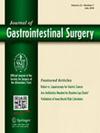Survival outcomes of adjuvant treatment in upstaged clinical T2N0 rectal cancer: are we underutilizing therapy?
IF 2.2
3区 医学
Q3 GASTROENTEROLOGY & HEPATOLOGY
引用次数: 0
Abstract
Background
Patients with rectal cancer staged as clinical T2N0 (cT2N0) are recommended to undergo upfront resection. However, when the tumor is subsequently upstaged to pathologic T3N0 (pT3N0), there are no clear guidelines for adjuvant treatment. This study aimed to analyze national trends in adjuvant management and to identify differences in morbidity or survival.
Methods
Using the National Cancer Database (2004–2020), adult patients with cT2N0 rectal adenocarcinoma that were upstaged to pT3N0 after resection were identified. The treatment groups included (i) surgery alone, (ii) surgery + postoperative (post-op) chemotherapy alone, (iii) surgery + post-op chemoradiation (CRT), and (iv) surgery + chemotherapy + CRT. Cox proportional hazard models and Kaplan-Meier curves (6-month landmark analysis) were used to compare survival outcomes.
Results
The analytic cohort included 800 patients who received the following treatments: surgery alone (496 [60%]), surgery + post-op chemotherapy (139 [17%]), surgery + post-op CRT (137 [15%]), and surgery + chemotherapy + CRT (69 [8%]). Patients who underwent post-op chemotherapy or chemotherapy + CRT had higher rates of poor/undifferentiated tumors (15.7% and 15.4%, respectively) than those who underwent surgery alone (8.8%) (P = .047). Over the study period, surgery alone decreased from 86.7% to 65.6%, with concomitant increases in post-op adjuvant therapy. Post-op chemotherapy (hazard ratio [HR], 0.336; 95% CI, 0.196–0.575) and chemotherapy + CRT (HR, 0.447; 95% CI, 0.231–0.866) remained independently associated with improved overall survival. Of note, 5-year survival was the lowest in the surgery-alone group (62.5%).
Conclusion
Post-op adjuvant regimens, including chemotherapy, were independently associated with improved survival in patients with cT2N0 rectal cancer upstaged to pT3N0. Adjuvant therapy may be underutilized in this setting.
分期较高的 cT2N0 直肠癌辅助治疗的生存效果:我们是否未充分利用疗法?
背景:建议分期为 cT2N0 的直肠癌患者接受前期切除术。然而,当直肠癌分期上升至 pT3N0 时,却没有明确的辅助治疗指南。本研究分析了全国辅助治疗的趋势,并确定了发病率或生存率的差异:方法:利用全国癌症数据库(2004-2020 年),对切除术后升期至 pT3N0 的 cT2N0 直肠腺癌成人患者进行鉴定。治疗组包括(1) 单纯手术;(2) 单纯手术 + 术后化疗;(3) 手术 + 术后化疗;(4) 手术 + 化疗 + 化疗。Cox比例危险模型和Kaplan Meier曲线(6个月地标分析)比较了生存结果:分析队列包括800名患者,他们接受了以下治疗:单纯手术(60%,n=496)、手术+术后化疗(17%,n=139)、手术+术后化疗(15%,n=137)以及手术+化疗+化放疗(8%,n=69)。与单纯手术(8.8%)相比,接受术后化疗或化疗+化放疗的患者的贫/未分化肿瘤率更高(分别为15.7%和15.4%)(P=0.047)。在研究期间,单纯手术的比例从86.7%降至65.6%,术后辅助治疗的比例也随之增加。术后化疗(HR=0.336,95% CI 0.196-0.575)和化疗+化放疗(HR=0.0.447,95% CI 0.231-0.866)仍与OS的改善密切相关。单纯手术组的五年生存率最低(62.5%):结论:包括化疗在内的术后辅助治疗方案与cT2N0直肠癌上分期至pT3N0生存率的改善密切相关。在这种情况下,辅助治疗可能未得到充分利用。
本文章由计算机程序翻译,如有差异,请以英文原文为准。
求助全文
约1分钟内获得全文
求助全文
来源期刊
CiteScore
5.50
自引率
3.10%
发文量
319
审稿时长
2 months
期刊介绍:
The Journal of Gastrointestinal Surgery is a scholarly, peer-reviewed journal that updates the surgeon on the latest developments in gastrointestinal surgery. The journal includes original articles on surgery of the digestive tract; gastrointestinal images; "How I Do It" articles, subject reviews, book reports, editorial columns, the SSAT Presidential Address, articles by a guest orator, symposia, letters, results of conferences and more. This is the official publication of the Society for Surgery of the Alimentary Tract. The journal functions as an outstanding forum for continuing education in surgery and diseases of the gastrointestinal tract.

 求助内容:
求助内容: 应助结果提醒方式:
应助结果提醒方式:


